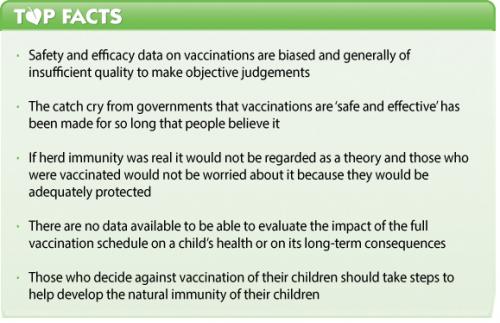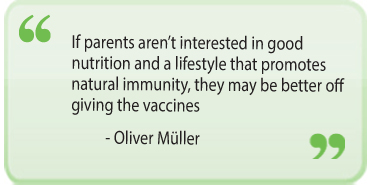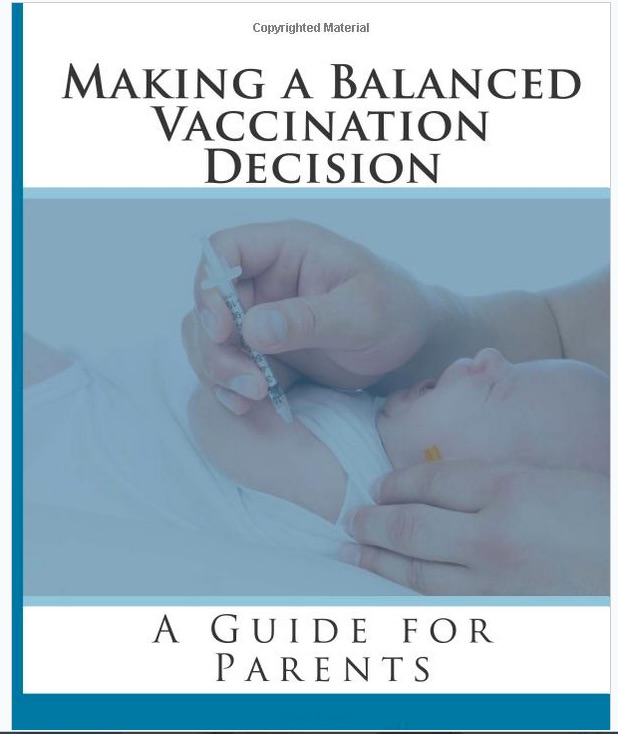With controversy over the HPV vaccine raging in the media and on the back of the American Medical Association’s decision to endorse the end of ‘religious exemptions’ to vaccination, we thought it useful to feed in some more views on vaccination.
In an exclusive interview, we asked Oliver Müller, UK-based author of the book and e-book Making a Balanced Vaccination Decision: A Guide for Parents — and father of two unvaccinated children — for his views.

Censored app
Oliver originally made an app (Vaccination Information Portal (VIP)) for smartphones to help parents inform themselves about vaccinating their children. But in December 2014, Apple removed the app from its AppStore with the reasoning that medical apps should only come from medical establishments. Oliver responded by publishing the information as an ebook, and has now also produced a hard copy. Although the decision as to whether to vaccinate or not should ideally lie with parents and legal guardians, VIP’s purpose is to help parents make an informed decision, and anyone utilizing the website is able to check the resources and links used so as to reassure themselves that they are reputable.
Anna Watson of the group Arnica described Oliver to us saying, “He is brilliant and thorough, and runs an Arnica group in Stroud (UK). He has researched this for years and has a great FB group alongside.”
We hope you’ll find our exclusive interview with Oliver helps to make your decision more informed.
Interview
ANH: Why do you think the vaccination debate is so polarised, with so many arguing that vaccinations are completely safe and fully effective, while others argue the opposite?
Oliver: Health authorities fear that admitting to any imperfection will immediately affect vaccination up-take among parents. They prefer to send out a simple message, one that keeps patients coming in for their shots. This message of “completely safe and effective” has been repeated so many times over decades that the public now finds it very difficult to question. With this view being accepted as as proven scientifically, which of course it isn’t, those who disagree can readily be made out as irrational and irresponsible. But science is never as black and white as the newspaper headlines.
ANH: Is it just a matter of scientific interpretation, or is there a genuine lack of studies of sufficient quality making opaque the science and so preventing a truly objective view about the safety and risks of vaccines?
Oliver:
It’s mainly a lack of good quality studies from independent sources. Studies are mainly conducted by manufacturers and published selectively. This is widely known among journal editors and scientists. Unfortunately it’s a reality that doesn’t seem to have made it through to front-line staff in our health system or to policy makers. So as it stands we have vaccination policy formed on the basis of trials, which were designed and carried out largely by manufacturers. They also decide which data to exclude, which outcome measures to apply and so on. Considering that the very same companies are trying to get the vaccine approved for sale, we cannot realistically rely on such data.
ANH: What’s your take on the herd immunity theory? Is it real or is it still in the realms of theory? Is it really a problem if a small number of people within a largely vaccinated community exercise their freedom of choice and avoid vaccines?
Oliver:
The evidence for herd immunity is mainly by association in that the incidence of diseases following the start of a vaccination campaign are often seen to also reduce, including in those who remain unvaccinated. The conclusion is then that those people were protected indirectly through a reduced circulation of the pathogen. The evidence against it is that most adults should be unprotected because we know our immunity to particular pathogens cannot persist for a lifestime when we are vaccinated in childhood. Consequently there can’t be a herd immunity effect and in theory we should see outbreaks of diseases such as diphtheria and polio, which clearly isn’t the case. Questions also have to be raised over outbreaks in highly vaccinated populations. There are plenty of these examples where over 95% of those who got ill were fully vaccinated. Clearly they were neither protected by the vaccine nor by herd immunity. So herd immunity must at this time remain a theory only.
The freedom not to vaccinate should be inviolable in any case. Whether or not it can cause problems if some don’t vaccinate is a question we can only answer once we can trust the efficacy and safety data for each vaccine. Certainly, if vaccines work, then those vaccinated should have nothing to worry about. The argument is often over a small number of children who cannot be vaccinated for medical reasons. Unvaccinated people are then accused of endangering them. Such claims make good headlines but are not based on science.
ANH: For new vaccines like the HPV vaccine, we have to be quite reliant on looking at results from clinical trials undertaken for the purpose of licensing. Do you think these can be subject to bias, or might their findings have limited application to the real world?
Oliver:
Both. Cervical cancer constitutes 2% of cancer cases diagnosed in UK women and 1% of cancer deaths, so to start with it seems out of proportion to try and vaccinate every girl with a dangerous vaccine. We don’t know if the HPV vaccine will ever prevent a single case of cancer. What we do know is that cervical cancer has certain risk factors attached to it, such as first sex early in life and a promiscuous lifestyle. That’s where we should start our prevention work.
ANH: There are obviously very different risk and benefit profiles between vaccines. Based on available data and case reports, which vaccinations, in your view, have the strongest positive balance of benefit and risk, and which the most negative?
Oliver:
One has to take into consideration the risk from each disease and based on that, the three meningitis-related vaccines would come out on top in my view. It’s the illness that worries parents most. Among our routine childhood vaccinations there are vaccines against pneumococcal, meningococcal and hib infections, all of which can cause meningitis. I wouldn’t vouch for the safety of the vaccines though. The HPV and MMR vaccines would come at the bottom for me. Mumps and Rubella in particular are diseases, which should be had in childhood. This then imparts life-long immunity. The vaccine, on the other hand, wears off and leaves us vulnerable just when we get to the stage where having the disease is really not a good idea. The MMR and HPV vaccines are the two with the highest safety concerns as well.

ANH: In the UK, do you think that parents are generally provided with enough information by the NHS or other authoritative sources to be able to make informed decisions about whether or not to vaccinate their children?
Oliver:
No. I have never seen a balanced NHS vaccination publication. They read like tabloid headlines, with simple “truths” for what they think are simple minds. But in fairness we can’t expect anything else. If the NHS told people about the downsides of vaccinations as well as the upsides and then left us to make up our own minds, this would undermine the decisions taken by the government to introduce the vaccines and the decision of the JCVI (Joint Committee on Vaccination and Immunisation) to recommend it in the first place. Once these bodies decide that a vaccine is a good idea, who is the NHS to tell people otherwise?
ANH: Do you think it’s possible to understand the kind of impact the full vaccination schedule has on a child, the development of his or her immune system and microbiome?
Oliver:
No and to my knowledge no attempt has been made to come to such an understanding either.
ANH: What’s your view about the current approach to balancing risk and benefit? In many ways, you’re trying to balance apples and oranges - the currencies of risk and benefit are generally quite different. What do you think?
Oliver:
We are still vaccinating against diseases that don’t exist in the UK any more. We also vaccinate against fairly benign diseases. Vaccine side-effects can be very serious and even fatal. Until we can trust the safety and efficacy data, how will we ever know for sure what the right decision is? Personally I know many parents who feel that they could handle the most common childhood diseases with correct, supportive care and treatment. The same can’t be said for vaccine damage, such as the many autoimmune conditions that appear to be caused by vaccine adjuvants. So I agree, we are not comparing apples with apples.
ANH: The HPV vaccination debate is in the news again. That’s largely down to the recently publicised cases of serious adverse reactions, such as Emily Ryalls and Katie Green. There’s also the freedom of information request data sourced by the Independent on adverse reactions which shows a much higher rate of adverse reactions from HPV than other vaccines. Do you think the MHRA and Department of Health have been transparent about what’s really going on, including since the switch from Cervarix to Gardasil in September 2012?
Oliver:
The HPV vaccine is indeed one of the most controversial vaccines. Safety trials for Gardasil compared side-effects between the vaccine and the vaccine’s adjuvant, a substance called Amorphous Aluminium Hydroxyphosphate Sulfate or AAHS. They called AAHS “the placebo” and concluded that Gardasil had similar results as “placebo” and was therefore safe. The US database for vaccine adverse reactions shows HPV vaccines as the most reported vaccine in recent years and whole websites are dedicated to documenting case reports of girls damaged by HPV vaccines. If we remember that the benefits of the vaccine are as yet speculative and may, in fact, never prevent a single case of cancer, the only honest response would be to withdraw the vaccine immediately.
ANH: What’s the most important advice you can offer parents who want the best for their children? What are some of the key resources they can use to inform their decisions? Are there some vaccinations that you think are more important than others?
Oliver:
I would recommend parents look at the issue holistically. It isn’t only a matter of vaccinate or don’t vaccinate but also of correct care, treatment and common sense. Once we start taking responsibility for our children’s health, we have to do so in all areas. For example if we look at meningitis again, giving fever-lowering drugs increases the risk, as does maternal smoking and use of antibiotics early on in life. Breastfeeding reduces the risk. If parents aren’t interested in good nutrition and a lifestyle that promotes natural immunity, they may be better off giving the vaccines.
Pro-vaccine resources are easy to find (e.g. NHS) but even vaccination-critical sources are nowadays only a web search away and often rank highly. Also, the Arnica network has local groups of parents interested in natural immunity all over the UK. A list can be found at www.arnica.org.uk. My own website has a database of scientific material for those who don't find this too hardcore, as well as a list of links to other resources.
ANH: What do you think about a zero-vaccination approach which is combined with parents helping their children to develop their own immunity to the maximum?
Oliver:
This is indeed my own approach and it’s not uncommon. Parents often start out delaying vaccinations and intending to vaccinate selectively later on. But researching vaccinations is often like the proverbial rabbit hole. Once you start, it leads you to conclusions you wouldn’t have thought possible before.
ANH: Many thanks, Oliver, for your valuable insights.
Get informed!
Oliver The book is available online and comes at a very reasonable price considering the importance of the information. It also comes with some very complementary reviews, below being one example:
“Fully and meticulously researched, this e-book is a must for any parent considering vaccinating their child. Having researched vaccination ourselves over many years (and fortunately beginning before we had children) we were already clear that it is a very bad idea - I would even say an epic travesty … This information is a timely antidote to the huge quasi-religious pro-vaccination lobby that seems to be much more about hiding possible side effects and making money rather than child health safety. If the research in this e-book is not enough for you then do your own, with an open mind, and you will find the same conclusions.” (Mr M D Wimpress).








Comments
your voice counts
There are currently no comments on this post.
Your voice counts
We welcome your comments and are very interested in your point of view, but we ask that you keep them relevant to the article, that they be civil and without commercial links. All comments are moderated prior to being published. We reserve the right to edit or not publish comments that we consider abusive or offensive.
There is extra content here from a third party provider. You will be unable to see this content unless you agree to allow Content Cookies. Cookie Preferences